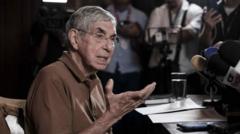Arias publicly criticized Trump in February, likening the president's attitude to that of a "Roman emperor," reflecting on the historical relationship between the United States and smaller nations in the region. He also voiced concerns about Costa Rica's shifting diplomatic relations under the current administration, which has been viewed as aligning more closely with US interests, especially in the context of the development of 5G technology, excluding Chinese firms. The revocation of Arias's visa follows a similar fate for three members of Costa Rica's national assembly who opposed exclusionary policies that may favor US businesses.
While Arias's case stands out, it is part of a broader trend, as at least 300 foreign students have also had their visas revoked amid increased scrutiny by the US government.
This revocation raises concerns about the implications for Costa Rica's foreign relations, the country's stance on China, and how criticism of US policies is addressed on an international scale.
While Arias's case stands out, it is part of a broader trend, as at least 300 foreign students have also had their visas revoked amid increased scrutiny by the US government.
This revocation raises concerns about the implications for Costa Rica's foreign relations, the country's stance on China, and how criticism of US policies is addressed on an international scale.





















